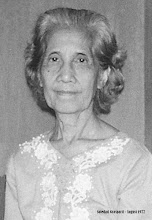Monday, August 10, 2009
To my beloved brother Ontoy Fonsing
Now the sun goes down the sky
sorrow comes to my heart
mass is played I like to cry
time brother to depart
Hold fast to our Savior dear
lest you slip on the way
leave your form in your grave here
for us to view each day
But oh will it ever look
as handsome as it is today
time records in its great book
that corpses have to decay
So therefore we shall just close
the grave where now you lie,
your memory we may not lose
although time passes by.
Lovely wreaths adorn your tomb
friends have brought them for you
may your soul in your heavenly home
smile on them down below
The crowd stands in silent awe
with tears your interment watch
Can they forget Aloha De
played as your funeral march
Tis sad to recall that end of day
when our hearts with grief were filled
but our confort is the memory
of the beauty of the life you lived.
by Soledad L. Grasparil
Wednesday, May 27, 2009
Memoirs of the War
March 24, 1943 - A. G. (Agaton Grasparil) arrived with other prisoners of war.
August 1943 - We transferrred to our house
January 1944 - A. G. acted as Mayor of the town (Fil. Govt.)
September 1944 - We secretly evacuated when A. G. received Col. Peralta's radiogram. We slept in Ubudan and at dawn walked to Calag-itan, crossing many rivers for there was much rain. Russel Tordesillas met us at Calag-itan. We proceeded to Trinidad. We built a cottage there near a spring. When Mac Arthur landed in Leyte in October 1944, guerillas were also strengthened in driving away the Japanese from Sibalom. On November 1, 1944, we returned home to Sibalom for we learned that the Japs concentrated themselves in San Jose. We slept at Tay Isco's again. We celebrated the 3 birthdays with a lechon while A. G. was away...
Wednesday, February 4, 2009
Letter of an American Visitor friend
What shall I call you? Your are someone I really look up to. I wish I could really explain how I feel about you. You are so special. How I wish you could come to California and let me entertain you.
I would love to hear you tell about your life. Would love to to have read some of your poems. You have a wonderful family but none can stand up to you. Maybe I am wrong to say this but I've never met a person who affected me at first sight like you did.
I spent 10 days in Honolulu. I did not enjoy it as much as I did in the Philippines. Everyone treated me royally.
All my family was glad to have me home. Have been busy since since. First weekend at home, we have the Rose Festival, next a Family reunion, then a free Sunday. Now, will entertain a Filipino couple from Manila this weekend then plan to go to Mexico to work at a mission for the deaf-mute mexico children. Will be gone a month.
So much fruit and nuts available now going to waste in the fields. Thank you for the beautiful bowl. All the gifts got here safe. The box Pec packed was never opened.
Love you lots,
Mama Eve.
Agaton Sabrine Grasparil
I. Passed regular Junior Teacher Civil Service Examinations at age 18 years. Served the Bureau of Public Schools for 39 years as Secondary Teacher, Principal and District Supervisor.
II. Reconnoitered Mt. Baloy for the location of the 61st Division Rear Command Post in December 1941. Went through the Japanese Naval blockade of Cebu in March 1942. Swam and floated for half a day in open sea near Manapla, Negros Occidental. Rescued 42 American Officers, Pilots and ground crew of San Jose, Mindoro airport in the mountains of Bululacao, Mindoro and ferried them to Panay in June 1942. As appointed Mayor of Sibalom in 1944, he prevented Japanese Air Force Captain Kobayashi from commandering 200 chickens, 5 cows, and 3 young ladies. Organized the Antique District Veterans Association comprising of 12 municipalities of the province and the ROLP Antique Chapter.
"In the future you will be called to the colors to defend or fight for your country. Read and learn about the Surrender or Fall of Bataan. As a Japanese Prisoner of War, I have suffered inhuman treatment, starvation, sun drying, bayonet treatment, dock labor, crowding in animal cars and ships' bodegas, and disease. My parting advice is therefore this: NEVER SURRENDER, BUT FIGHT TO THE FINISH IF YOU CAN NOT ESCAPE." - Agaton S. Grasparil
Monday, January 12, 2009
Speech introducing Gov. Tobias Fornier, May 1945
Ladies and Gentlemen,
We are only too glad that the war is over. That there are no more Japanese whom we feared would catch us and cut off our heads anytime.
Now we are beginning to resume our prewar situation. We have been blessed with a fair harvest and with the reduction of prices of foodstuffs, clothing and other commodities. Every week, we hope that our normal life will return very soon. Then too our homes are fast being rebuilt and our government is doing its great task of guiding, helping , and protecting us, my fellow countrymen. Soon we shall have our election when we shall be free to express our convictions and our own free will.
As we enjoy this peace and contentment after undergoing the terrible days of fear and hardships during the war, we can never forget the past, especially those trying times when our lives were at stake. While we cannot forget our brothers, the guerillas, who fought bravely against the Japanese, and who helped to drive them away, we who lived in the occupied territory during the days of surrender, cannot forget the man who was ready to die for us and whom we owed our safety from the hands of our cruel visitors, the Japanese. I have the honor to present to you, our protector, the Honorable Governor Tobias Fornier.
By: Soledad L. Grasparil, May 1945
Friday, January 9, 2009
Lola: A Fond Recollection
(A Tribute to Lola Soledad Lotilla vda. de Grasparil)
April 9, 1994
Lola, as we her grandchildren fondly call her, is a very inspiring woman. Never blinded by luxury, she lived a simple, meaningful life.
I am blessed to experience lola's loving company when she was still healthy, socially active, and had good memory. Her physical death today has opened the floodgates of my treasured memories with her. Looking back, I could see some golden moments of yesteryears.
Time was when I, my brothers and lone sister were still living under one roof with Lola. As precious kids are wont to do, we would often play around , make abstract arrangements of our pieces of furniture, throw small odd things here and there, and have instant boxing bouts followed by loud wails of the vanquished. With all the mess we made, not an angry shout of invective was heard from her. She was the epitome of coolness, patience, and grace under trying circumstances.
Some evenings when the sky were clear and we were out stargazing, she would patiently point at and name the constellations and planetsin view. When rare astronomical phenomena occurred like the appearance of a comet or a solar or lunar eclipse, she would gather us and explain them to our satisfaction. She was an effective teacher.
Relaxed moments were spent listening to her stories from the lives of great men to the adventures of Ulysses in Homer's twin epics; "The Odyssey" and "Iliad". She was a good storyteller.
During her spare time, she either made pillows out of Kapok fiber or reading old books, write speeches or composed poems. To her, words flowed as easily like spring water. She was an imaginative writer.
She could command obedience without raising a howl. Her authority emanated from her consistently upright though imperfect life. She always meant what she said. And she hated lies. No wonder she could look straight ahead with honest confidence.
She was frugal. She would rather use salt instead of toothpaste to brush her teeth, manualy-extracted coconut oil rather than commercial shampoo to wash her hair, a dust of talcum baby powder on her face rather than make-up, or wore simple dress with no jewelry. Skin-deep beauty was not her concern but rather one that was ageless which came out of her gentle and quiet spirit.
Above all, she had faith as strong as a rock, which explained her serene composure in the face of problems. She did not force us to go to Church but her different lifestyle and dedication to the Lord's work were more than enough to speak for the reality and power of the God she worshipped and obeyed.
So much more can be said about Lola. But time is too short to enumerate them all. Suffice it to say that enough had been poured out for reminiscence. The rest remains in the vaults of the heart.
Lola, you have left ahead of us into the bosom of our loving Father. But I know that we will be reunited once again in eternity. For the moment, thank you for the exemplary life you shared to me and the rest of your grandchildren. Though you will be physically absent from now on; though we would be missing your sweet singing and uplifting smiles; yet your memory will forever be etched in our hearts.
God bless you for finishing your race.
by: Victor G. De Gracia Jr.
4th apo
In The Foxhole (poem)
To Whom It May Concern (poem)
(Dedication on my prize to the amillero when I was President of the Juego de Cursillo in a town fiesta in 1926)
To you who loved athletics
And joined the ribbon race
Is given this can of biscuits
To wish for health and long days
To you who loved to help
From Church that is in need
Is given this prize of honor
For your patriotic deed
To you who had the fortune
To get my ring and ribbon
Is given this humble premium
With hearty congratulations
by Soledad A. Lotilla (Grasparil)
(My ring and ribbon was gotten by Mr. Manuel Morales)
The Birth of the WAS (poem)
February 15, 1946
When we lived under pressure
Of the Japanese stern control
We formed an association
With the women on the role
We met, we planned, and we discussed
Matters for home improvement
We partook in the town's program
and helped in the disguised movement
We held parties among ourselves
To while dreary hours away
Inspired the girls for higher learning
Till schools come again someday
Then our brothers from the mountains
Signalled that we all go out
For the town they would attack
Heroically the japs to rout
Hiding our motives from the invaders
We obeyed them and we fled
We cared not for our losses
Our dear lives just to save
When we returned home happily
To find no Japanese on our way
We felt grateful to our beloved brothers
For driving the Nippons away
We then met and reorganized
To form the WAS outright
Our main purpose just to aid
Our soldiers in the fight
Onward then o ye sisters
Your loyal support to continue
If at the front we cannot fight
Behind line our part we must do
by Mrs. Soledad L. Grasparil
for our paper The Torch
Soledad Alera Lotilla Grasparil


